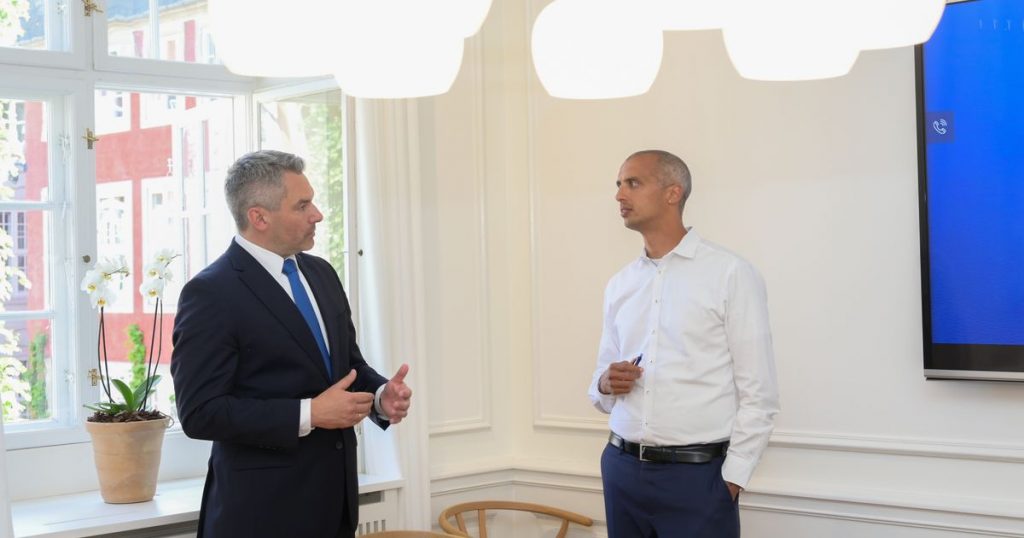Interior Minister Karl Nehamer (left) and Danish Immigration Minister Matthias Tesfaye.
© J ‹RGEN MAKOWECZ
COPENHAGEN, Vienna – Interior Minister Karl Nehamer (ÖVP) examined Denmark’s strict immigration policy and return system in Copenhagen on Wednesday. “The European asylum system is broken,” said Migration Minister Matthias Tesfaye after his meeting with Nehammer. This is one of the reasons why Denmark has set up asylum centers in third countries. Nahamer then visited a return center for rejected asylum seekers near the Danish capital.
Tesfaye justified the restrictive immigration policy of the social democratic Danish government with the phrase: “Without social cohesion there is no welfare state.” At the beginning of June, Parliament in Copenhagen laid the legal basis for asylum facilities outside Europe, for example in Africa, with funding from Denmark. According to the plans, asylum seekers should be able to apply there.
However, it is planned that people who have been granted asylum are not necessarily allowed to enter Denmark, but must remain in the third country in question. The Danish plans have been heavily criticized by the European Union Commission and the United Nations High Commissioner for Refugees, among others.
Nahamer commented on the Danish project in front of journalists with the following words: “With plans for asylum centers in third countries, Denmark returns asylum law to the original idea of the Geneva Convention on Refugees. Because the point is that there is a right to protection from persecution, but no right to choose which country One wants to live in it. The proposed measures could provide impetus for Europe and significantly advance discussions about the new asylum and immigration policy.”
However, the two ministers were cautious about possible cooperation between Vienna and Copenhagen in these centers. Nehamer and Tesfaye referred to Denmark’s withdrawal from the EU’s rules on justice and home affairs. “This gives us opportunities that Austria does not have,” said the Danish minister.
Visit the return agency and return center
After speaking with Tesfaye, Nahamer visited the Danish Repatriation Agency, which is responsible for repatriating rejected asylum seekers and other people without residency rights since August 2020. The visit to the repatriation center “Siegel Mark” was also mentioned. In the former barracks area with brick barracks not far from Copenhagen, people who have not been granted residence in Denmark are housed. The facility is designed to accommodate 400 people; 112 adults – both men and women – currently live in lightly furnished rooms with shared showers and toilets. They mainly come from Iraq, Iran and Afghanistan. According to the Danish authorities, they are all people who currently do not want to return to their countries of origin. In their conversations, staff at the return authority tried to persuade them to use the return assistance they received from Denmark to build a new life in their home country, according to the minister’s on-site inspection.
After the visits, Nahamer stressed: Austria and Denmark should push together so that the EU Commission starts implementing things in asylum policy that are undisputed across Europe. This included border security, effective returns and expedited asylum procedures. Another thing Austria and Denmark have in common is: “The Danes are looking for solutions with third countries that are as safe as we are.”
Little green done
However, the Austrian Greens were not very pleased with the interests of the coalition partners in emigration. There are always proposals to outsource the asylum procedure to third countries. “What they all have in common is that they have never even begun to act, simply violating existing EU and international law,” the Green Party’s spokesperson for home affairs, security and asylum policy, Georg Borstmayr, said in Wednesday’s broadcast. Such a solution “would not exist in any case with greens.” “Pan-European solutions are needed, not unilateral approaches,” Borstmayr said.
The FPÖ party also spoke about the trip of the Minister of the Interior. Security spokesperson Hannes Amesbauer was skeptical of the seriousness: “Unfortunately, with the turquoise ÖVP, you can never be sure whether ads and apps ultimately pursue the same goals,” Amesbauer said in a broadcast. “We will put today’s Minister of the Interior’s rant, which he relayed publicly from Denmark, to the test tomorrow in the National Assembly!” The Liberal member of the National Assembly referred to a motion for a resolution that his party wanted to introduce. This calls on the Minister of the Interior to implement the Danish initiative by asylum centers in third world countries. (what or what)

“Food practitioner. Bacon guru. Infuriatingly humble zombie enthusiast. Total student.”







More Stories
NATO and the G7 promise to provide more assistance in air defense
One word was enough: An Israeli minister raises a scandal after the attack on Iran
AUA suspends more flights to the Middle East